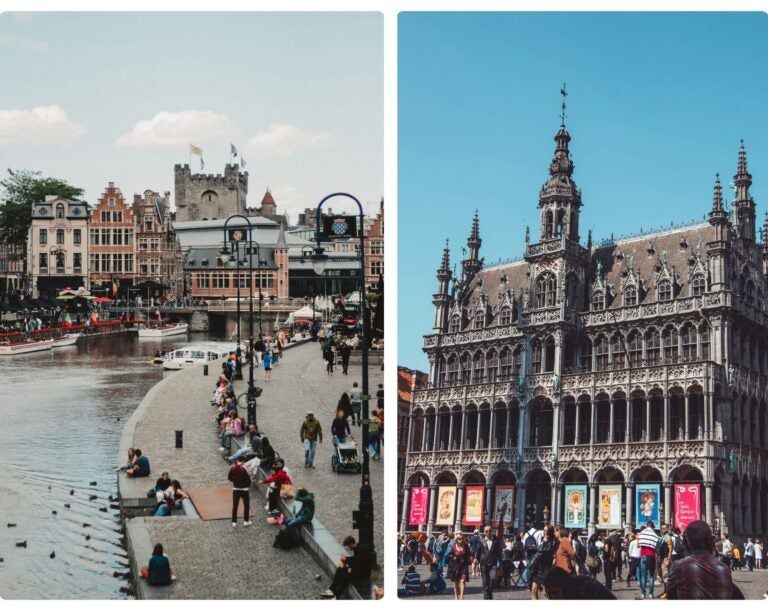How to study in Belgium for international students?
Find here all the information about how to study in Belgium for international students, steps, tips, requirements, and more.
Belgium’s education system is an appealing choice for international students, thanks to its wide range of academic programs, high-quality institutions and facilities, and strategic location in Europe. If you’re thinking about continuing your studies there, this article will guide you through everything you need to know about how to study in Belgium for international students. Its multilingual approach and affordable tuition fees make it an excellent destination for students from around the globe.
This guide covers everything you need to know about studying in Belgium — from how the Belgian education system works, admission requirements, and a step-by-step breakdown to help you choose the best option based on your academic goals. And if you’re considering studying online instead, we’ve also included useful information on how to pursue a Belgian education remotely.
How does the education system work in Belgium?
Belgium’s education system stands out for its diversity and high standards. It’s organized around three main language communities — Flemish, French, and German — each with its own education system, though they all share some common features.
Educational levels in Belgium
In Belgium, education is organized in levels:
- Primary education: Lasts for six years and is compulsory from the age of six.
- Secondary education: Six more years and is compulsory until the age of 18.
- Higher education: Includes undergraduate, master’s and doctoral programs, offered both at universities and specialized higher education institutions.
Higher Education in Belgium
University education in Belgium is mainly divided into:
- Bachelor’s degrees: Lasting three years.
- Master’s degrees: These vary between one and two years depending on the program.
- Doctorates: Often require three or more years of research, depending on the area of study.
Belgian universities are well known for offering multilingual programs. It’s quite common to find courses taught in English, especially at the master’s and PhD levels, making them highly accessible to international students.
Academic year in Belgium
The academic year in Belgium starts in September and is split into two semesters. The first runs from September to January, and the second from February to June. Major holidays include a Christmas break, a spring break, and summer vacation, which usually begins in July.
International recognition in Belgium
Degrees earned in Belgium are widely recognized across the European Union and beyond, thanks to the Bologna system, which promotes academic mobility and ensures that qualifications are acknowledged throughout the European Higher Education Area.
Requirements to study in Belgium as an international student
Studying in Belgium requires certain academic, administrative and legal requirements. Here is a list of the essentials:
1. Choose a study program and university
The first step is choosing what program you want to study and where. Some of Belgium’s most prestigious universities include KU Leuven, the Université Libre de Bruxelles (ULB), and Ghent University (UGent). Be sure to check the specific admission requirements for your chosen program, as they can vary from one institution to another.
2. Language level
Depending on the language community where you study, you may need to prove your language proficiency:
- Flemish (Dutch): Required at institutions in the Flemish region.
- French: Required for study at institutions in the French-speaking region.
- German: At institutions in the small German-speaking region.
- English: For international programs, especially at the master’s and doctoral levels.
You must submit certificates of language proficiency, such as TOEFL or IELTS for English, or equivalent exams in French or Dutch.
3. Student Visa
If you are from a country outside the EU, you will need a student visa. This process includes:
- Letter of acceptance from the Belgian university.
- Proof of sufficient financial means to cover your stay.
- Valid medical insurance.
- Criminal record certificate (in some cases).
- Recent medical examination.
4. Academic degrees and equivalencies
You’ll need to submit your previous diplomas and academic transcripts, officially translated into French, Dutch, German, or English. In some cases, you may also be required to apply for a recognition of equivalence to confirm that your prior education meets Belgian standards.
5. Admission tests
Some institutions and specific programs may require you to take admissions tests, especially for areas such as medicine, engineering or the arts.
6. Financial resources
The Belgian government requires international students to prove they have enough financial resources to cover tuition, housing, living expenses, and transportation. This can be demonstrated through:
- Bank statements.
- Proof of scholarships or student financing.
- Financial guarantees provided by a sponsor.
The amount required may vary, but is usually around 10,000 to 12,000 euros ($11,200-13,500) per year.
7. Medical insurance
You’re required to have valid health insurance for the entire duration of your stay in Belgium. If you’re from an EU country, you can use your European Health Insurance Card. If not, you’ll need to either purchase private insurance or enroll in the Belgian social security system.
8. Tuition and fees
Tuition fees in Belgium are relatively affordable compared to other European countries. Annual costs typically range from 900 to 4,500 euros ($1,000-5,060), depending on the level of study, the university, and whether you’re an EU citizen or not.
9. Accommodation
Most universities offer student housing, but many international students also choose to rent apartments or share flats. It’s important to arrange your accommodation early, as demand tends to be high at the start of the academic year.
10. Scholarships and financial aid
There are plenty of scholarships available for international students, offered by the Belgian federal government, the European Union, and individual institutions. Notable examples include Erasmus Mundus scholarships and those provided by the Belgian Development Cooperation agency (ARES).

How to study in Belgium as an international student
If you’ve chosen Belgium as your study destination, it’s important to follow a clear and organized process to meet all the requirements and get ready for your new academic journey. Below, we’ll walk you through each step — from initial research to your first day of class — to help ensure everything goes smoothly.
1. Evaluate universities and courses in Belgium
The first step to studying in Belgium is researching universities and programs that align with your academic interests and career goals. Belgium is home to internationally respected institutions offering a wide range of programs in fields like science, humanities, engineering, and business.
Key factors when evaluating options:
- Academic reputation: Check university rankings such as QS World University Rankings or Times Higher Education.
- Programs offered: Check whether the program you wish to study is available in English, French, Dutch or German, depending on your language preference.
- Location: Consider whether you prefer to study in cosmopolitan cities such as Brussels or in quieter places such as Leuven or Namur.
- Cost: Compare tuition fees and living costs in different regions of Belgium.
Useful resources:
- Check out university websites, browse international student forums, and explore social media for firsthand insights into what studying in Belgium is really like.
2. Review financing options for studies in Belgium
Once you’ve chosen your program and university, the next step is to figure out how you’ll fund your studies. While education in Belgium is relatively affordable, having a solid financial plan is key.
Funding options available:
- Scholarships: There are many scholarships available through the Belgian government, the European Union, and the universities themselves. Some of the most notable include Erasmus Mundus scholarships and ARES grants for students from developing countries.
- Educational loans: If you do not qualify for a scholarship, some banks and organizations offer loans at competitive rates to finance international studies.
- Sponsorship: Financial support from a family member or sponsor can be a valid option, especially to cover initial expenses.
- Student work: International students in Belgium can work up to 20 hours per week during the academic period, which can help you cover some expenses.
Practical advice:
- Research scholarship application deadlines and be sure to meet specific requirements, such as submitting essays or cover letters.
3. Apply to a study program in Belgium
The next step is to officially apply to your chosen program. Most Belgian universities use an online application system, making the process straightforward and accessible for international students.
Application process:
- Review specific requirements: Each program has unique criteria, such as minimum language levels, academic background, and portfolios (in the case of artistic majors).
- Create an online profile: Many universities use online platforms where you will have to fill in your personal information, upload documents and pay an application fee.
- Send the necessary documents: Generally include:
- Valid passport.
- Officially translated academic certificates.
- Cover letter.
- Updated CV.
- Language tests (TOEFL, IELTS, DELF, etc.).
- Wait for a response: Universities usually respond within 4 to 12 weeks after receiving your completed application.
Practical advice:
- Apply to multiple colleges to increase your chances of admission. If you receive more than one offer, you will be able to choose the option that best suits your needs.
4. Applying for a visa to study in Belgium
If you’re a non-EU citizen, you’ll need a student visa to study in Belgium. The process might seem a bit complex at first, but by following the right steps, you can secure your visa without any major issues.
General requirements for the student visa:
- Official letter of acceptance from the Belgian university.
- Proof of financial solvency showing that you can cover the costs of tuition and living expenses.
- Medical insurance valid in Belgium.
- Criminal record certificate, depending on your country of origin.
- Proof of accommodation in Belgium.
Application process:
- Application must be made through the Belgian consulate or embassy in your home country.
- Submit all required documents along with the application form.
- Make the payment of the corresponding fees.
Estimated time:
- The student visa can take between 4 and 12 weeks to be processed, so it is important to start this process well in advance.
5. Moving to Belgium
The final step before starting your studies is getting ready to move. While it’s an exciting time, careful planning is essential to ensure a smooth transition.
Key preparations before traveling:
- Accommodation: Make sure to book your accommodation in advance, whether it’s a university residence or a private apartment. Platforms like HousingAnywhere and Spotahome are great resources for finding reliable options.
- Essential documents: Bring both physical and digital copies of all your important documents, including your visa, passport, acceptance letter, and academic transcripts.
- Transportation: Familiarize yourself with the Belgian public transportation system, which includes efficient and affordable trains, streetcars and buses.
Tips for adjusting to your new life in Belgium:
- Register at your local town hall within the first few days of your arrival.
- Join international student communities to socialize and receive support in your adaptation process.
- Learn basic phrases in Dutch or French to ease your daily life.
Important: If you are a frequent traveler and want to stay connected without worrying about expensive roaming or looking for a new SIM at every destination, Holafly’s subscription plans are for you. With a single eSIM, enjoy internet in more than 170 countries for a fixed price and no surprises on your bill. Travel without limits and connect easily and securely! 🚀🌍

How much does it cost to study in Belgium as an international student?
Studying in Belgium can be a rewarding experience, and while costs are relatively affordable compared to other European countries, it’s still important to budget wisely. Here’s a breakdown of the main expenses you should keep in mind.
Accommodation for students in Belgium
The cost of accommodation varies according to the city and the type of housing:
- University residences: Between 200 and 450 euros ($225-500) per month. These are usually cheaper and are close to the campuses.
- Shared apartments: Between 300 and 600 euros ($340-670) per month, depending on the location.
- Individual studios: Between 500 and 800 euros ($560-900) per month.
Transportation in Belgium
Belgium has an efficient and affordable public transportation system:
- Monthly passes for students: 20 to 30 euros ($22-33), depending on the region.
- Single tickets: Between 2 and 3 euros ($3-5).
- Discounts for public bicycles: Belgian cities promote the use of bicycles with monthly rates starting at 10 euros ($12).
Food in Belgium
Food expenses will depend on whether you decide to cook at home or eat out:
- Supermarkets: The average monthly expenditure is 200 to 300 euros ($225-340).
- Affordable restaurants: A menu in a simple restaurant costs between 10 and 15 euros ($12-18).
- Fast food or cafeterias: Options available for less than 8 euros ($10).
Tuition fees and courses in Belgium
Tuition fees vary depending on the level of studies and your country of origin:
- EU students: Fees typically range from 850 to 4,000 euros ($960-4,500) per year.
- Non-EU students: Between 2,500 and 6,000 euros ($2,800-6,750) per year for undergraduate programs.
- Master’s and PhD programs: Costs can range from 4,000 to 12,000 euros ($4,500-13,500) per year at recognized universities.
Other expenses in Belgium
- Study materials: Between 50 and 100 euros ($60-115) per semester.
- Medical insurance: Around 100 euros ($115) per year, compulsory for foreign students.
- Leisure and cultural activities: A monthly budget of 50 to 100 euros ($60-115) will be enough to enjoy recreational activities.

When and how to homologate diplomas and courses in Belgium?
Having your qualifications recognized is a key step if you plan to continue your studies in Belgium, especially if your educational background differs from the European system.
When is homologation required in Belgium?
The homologation is mandatory if:
- Your degree or diploma is not issued by a member country of the European Higher Education Area (EHEA).
- You want to enter master’s or doctoral studies at a Belgian university.
- The program requires a prior evaluation to determine academic equivalence.
How is the homologation done?
- Request equivalence: Get in touch with the Wallonia-Brussels Federation, or the relevant authority in Flanders or the German-speaking region, depending on the language and location of your university in Belgium.
- Required documentation:
- Original degree and sworn translation into French, Dutch or German.
- Transcript of grades or academic record.
- Updated CV.
- Proof of payment of the homologation fees (between 150 and 200 euros ($170-225)).
- Review and evaluation: The Belgian institution evaluates whether your degree meets local standards. This process can take from 2 to 6 months.
- Receive the resolution: Once homologated, you will obtain a certificate of equivalence that will allow you to continue your studies.
Study online in Belgium as an international student
If you cannot relocate to Belgium, studying online is an excellent alternative to access the country’s quality education from anywhere in the world.
Options available in Belgium
- Online courses from Belgian universities: Many universities offer virtual programs in areas such as business, technology and social sciences.
- Example: KU Leuven and Université catholique de Louvain (UCLouvain) have distance learning master’s degrees.
- MOOCs (Massive Open Online Courses): Platforms such as Coursera and edX collaborate with Belgian institutions to offer free or low-cost courses.
- Example: Courses in sustainability, engineering and economics.
- Hybrid programs: Some universities allow you to combine online and face-to-face classes, ideal for those who plan to move to Belgium later on.
How to enroll?
- Select the program: Search for courses on the official websites of Belgian universities or on MOOC platforms.
- Requirements: Although less strict than face-to-face programs, some programs require proof of language or previous academic experience.
- Enrollment: Complete the online form and make the corresponding payment.
Frequently asked questions about how to study in Belgium for international students
Not necessarily. Many universities offer programs in English, especially at the master’s and PhD levels. That said, learning the local language can really help you adapt and make the most of your experience.
Yes, international students can work up to 20 hours per week during the semester, as long as they have a valid student contract.
Required documents typically include your university acceptance letter, proof of financial means, health insurance, and a police clearance certificate, among others.
The processing time varies from 4 to 12 weeks. We recommend starting the process at least 3 months before the start date of classes.
Among the most prominent are KU Leuven, Ghent University, Université libre de Bruxelles (ULB) and Université catholique de Louvain (UCLouvain).
Yes, there are several options, such as the Erasmus Mundus scholarships, the Flemish government scholarships and the Wallonia-Brussels Federation scholarships, among others.





 Language
Language 


















 No results found
No results found



